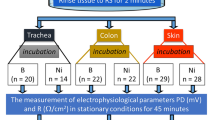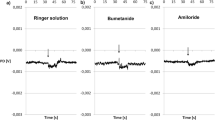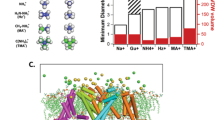Abstract
THEORIES of general anaesthesia have frequently been based on the suggestion that anaesthetic agents perturb the transport of ions through cell membranes1,2. In some theories, inhibition of transport has been invoked3,4, whereas in others5, facilitated transport in the presence of anaesthetics is proposed, but experimental evidence for either of these views is often contradictory. Anaesthetics have been observed to inhibit cation fluxes across nerve cell membranes during the transmission of impulses6, and recently work on inverted frog skin preparations7 and on the isolated toad bladder8 has indicated that active cation transport may be affected by general anaesthetics. We have investigated the effect of ether and chloroform on active cation transport in human red cells.
This is a preview of subscription content, access via your institution
Access options
Subscribe to this journal
Receive 51 print issues and online access
$199.00 per year
only $3.90 per issue
Buy this article
- Purchase on Springer Link
- Instant access to full article PDF
Prices may be subject to local taxes which are calculated during checkout
Similar content being viewed by others
References
Cherkin, A., Ann. Rev. Pharmacol., 9, 259 (1969).
Smith, E. B., Physiology and Medicine of Diving (edit. by Bennett and Elliot), 8 (Baillière, Tindall and Cassell, London, 1969).
Mullins, L. J., Chem. Rev., 54, 289 (1954).
Miller, S. L., Proc. US Nat. Acad. Sci., 47, 1515 (1961).
Bangham, A. D., Standish, M. M., and Miller, N., Nature, 208, 1295 (1965).
Mullins, L. J., Fed. Proc., 27, 898 (1968).
Gottlieb, S. F., and Savran, S. V., Anesthesiology, 28, 324 (1967).
Anderson, N. B., Anesthesiology, 28, 438 (1967).
Harris, J. E., J. Biol. Chem., 141, 579 (1941).
Whittam, R., J. Physiol., 154, 608 (1960); Bakhle, Y. S., thesis, Univ. Oxford (1962).
Kahn, J. B., and Acheson, G. H., J. Pharmacol. Exp. Therap., 115, 305 (1955).
Faulconer, A., Anesthesiology, 13, 361 (1952).
Thomas, D. M., MacKrell, T. N., and Conner, E. H., Anesthesiology, 22, 542 (1961).
Seeman, P., Sanks, T., Argent, W., and Kwaut, W. O., Biochim. Biophys. Acta, 183, 476 (1969).
Latner, A. L., Proc. Roy. Soc. Med., 58, 895 (1965).
McIlwain, H., Enzymes and Drug Action (edit. by Mongar and de Reuck), 170 (Ciba Foundation Symposium, 1962).
Bennett, P. B., and Hayward, A. J., Nature, 213, 938 (1967).
Author information
Authors and Affiliations
Rights and permissions
About this article
Cite this article
HALSEY, M., SMITH, E. & WOOD, T. Effects of General Anaesthetics on Na+ Transport in Human Red Cells. Nature 225, 1151–1152 (1970). https://doi.org/10.1038/2251151a0
Received:
Issue Date:
DOI: https://doi.org/10.1038/2251151a0
This article is cited by
-
Effects of halothane on the sympathetic nerve terminals of the rabbit heart
Naunyn-Schmiedeberg's Archives of Pharmacology (1974)
-
All Lipid-soluble Anaesthetics protect Red Cells
Nature New Biology (1971)
-
Mechanism and Prevention of Inert Gas Narcosis and Anaesthesia
Nature (1970)
Comments
By submitting a comment you agree to abide by our Terms and Community Guidelines. If you find something abusive or that does not comply with our terms or guidelines please flag it as inappropriate.



